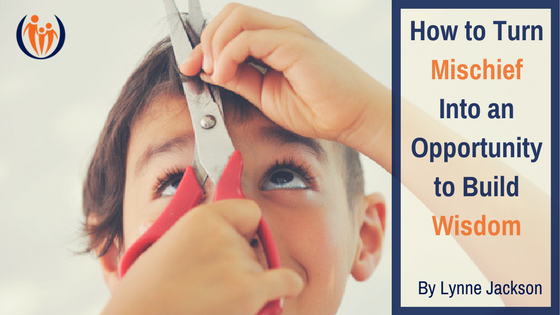
How to Turn Mischief into an Opportunity to Build Wisdom

Becky and her two daughters, six-year-old Brianna and four-year-old Maisie, were at a playdate. The girls were downstairs with an older girl who was bit of a mischievous spitfire. Maisie came up and Becky noticed immediately that her hair had been cut.
Instead of flying off the handle, Becky curiously asked, “Huh, what happened down there?” The little girl’s eyes lowered and she truthfully responded, “We cut our hair.” Becky had Maisie go get her older sister and they headed home.
Becky wanted the girls to think through the natural impact of their decisions so she asked more questions. “What do you think we need to do to fix your hair?” The girls answered sheepishly, “We need to get our hair cut.”
“How do you think we will pay for that?”
“With our piggy banks?” They both answered with tears in their eyes. They had each been saving up for something special.
They decided together that the girls would pay as much as they could from their piggy banks and then would do chores to make up the difference. The girls also realized their short haircuts may raise some questions so Becky talked through with the girls, “What will you say when someone asks you about your hair?” The girls responded with quiet voices, “We cut our own hair.”
Becky also wanted the girls to understand the safety issues related to their little beauty salon adventure. “Can you tell me why playing with scissors without adult supervision was a dangerous choice?” The girls came up with various reasons on their own. Big sister, Brianna, even realized that she needed to set a good an example for her little sister, Maisie.
The girls’ scissors privilege was suspended until they could help write some guidelines about how to use scissors – what’s okay to cut and what’s not okay to cut. And in order to strengthen their judgment around their mischievous friend, at the next play date they looked for things in her basement that may be unsafe. Becky sensed that the girls understood what sort of things were safe and what were not. When she asked “Do you think you’re ready to play wisely down here?” the girls determined they were ready to be safely unsupervised.
Even if your kids no longer butcher their own locks, you can apply the principles Becky followed with kids of any age:
- She stayed calm and looked for the learning opportunity in the situation.
- In the first half of this story – she made no judgments and instead asked numerous thoughtful questions focused on building insight and solutions for which her kids were responsible.
- Privileges were suspended — only until it was clear the kids had learned what they needed to play safely again.
What stands out to you in her approach and how could you apply it to a misbehavior with your child?
Apply It Now:
- How could you maximize your child’s learning through thoughtful, relaxed questions about the natural impact of his/her actions?
- How could you equip your child to make a wiser response next time, with privileges on hold if necessary until this is demonstrated?
Take 15 minutes to learn how to give consequences that teach, rather than simply punish, by downloading our free ebook Consequences That Actually Work.

